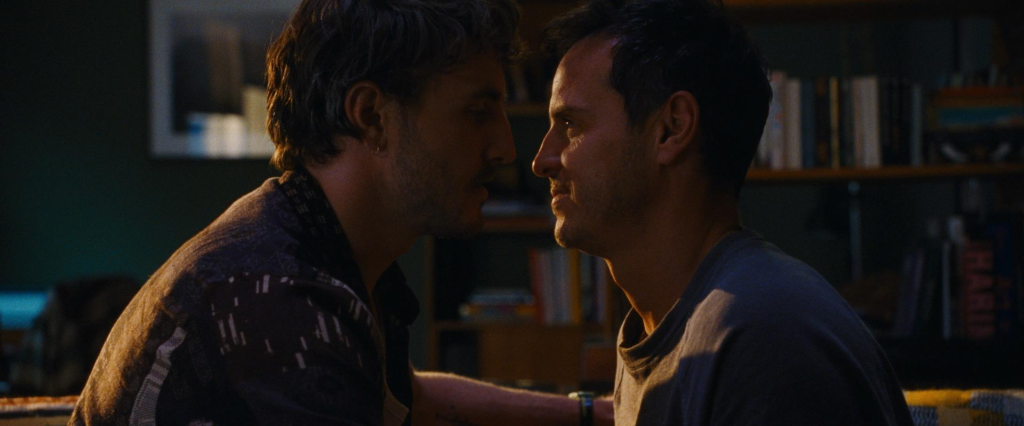ALL OF US STRANGERS reviewed by GREG KING
Director: Andrew Haigh
Stars: Andrew Scott, Paul Mescal, Jamie Bell, Claire Foy.

Adam (Andrew Scott, from the queer themed Handsome Devil, etc) is a gay middle-aged screen writer who lives by himself in a high-rise apartment block in London, although the building itself seems almost deserted. He spends most of his time listening to vinyl records and watching 80s music videos on his tv. One night a fire alarm sounds, and Adam evacuates his apartment and heads down to the street. While staring up at the building he sees one lighted apartment with a man framed in the window looking down at the street.
Soon after that man knocks on Adam’s door looking for company. He is Harry (Paul Mescal, from Aftersun, etc), and he is drunk. Harry is scruffy looking and appears a bit rough around the edges. Both men are lonely, and despite Adam’s initial hesitation the two men soon become romantically involved. Both men are in their own way lost souls and the relationship between the two is fragile. Harry seems self-destructive while the older Adam is suspicious of commitment. But the relationship between the pair intensifies.
Adam is still struggling with the death of his parents, who were killed in a car crash on Christmas Eve thirty years earlier, when he was just 12. After revisiting an album of photographs, he travels by train back to Croydon where he visits his childhood home and chats with the ghosts of his past and reconnects with his mother (Claire Foy) and father (Jamie Bell). Although he has aged, they remain at the same age they were when they were killed so they can connect as adults now. They both welcome Adam back to the house and ask him about his life and what has happened to him over the years. Mum expresses her own feeling of uneasiness about Adam’s gay lifestyle, her views reflecting the fearful attitudes towards homosexuality in the era of AIDS. His father expresses his own feelings of inadequacy and ignorance in dealing with Adam’s childhood trauma and his sexuality.
This ethereal, lyrical and sensitive queer love story and ghost story is loosely based on the 1987 novel Strangers from Japanese author Taichi Yamada and has been adapted to the screen by writer/director Andrew Haigh (45, Weekend, etc). The film deals with themes of connection, relationships, family, loss and trauma, the past, memories and regrets, childhood, fears for the future, queer identity, coming out, and the power of love as a cathartic healing force. This is a deeply personal and idiosyncratic film from Haigh, full of honesty and raw emotions, and is, arguably, his best work to date.
All Of Us Strangers is essentially a four handed drama with strong and natural performances from the four leads. Scott is great and gives us a deeply troubled and haunted Adam, delivering a heartfelt and sensitive performance full of uncertainty, doubt, insecurity and vulnerability. His performance anchors the film. Mescal, who has had a very busy year appearing in no less than four films, gives his Harry a rougher edge as he slowly peels back the hidden layers of his character. He brings a rakish charm to the character, but he is also hiding a personal pain. There is palpable chemistry between the pair, and it is hard to imagine any other actors bringing such conviction to the material. Bell also delivers a more mature, honest and subtle emotionally charged performance, particularly in the scene in which Adam reveals his sexuality, while Foy is strong and brings warmth to her character.
The eerie, bluish tinged and muted cinematography from Jamie Ramsay (Living, etc) gives the material a ghostly aesthetic and a dream-like quality. What is real and what is fantasy? Many of the characters are seen as ghostly reflections. Ramsay gives the view of the countryside from the train window a dizzying strobe-like quality. Emilie Levienaise-Farrouch’s background score further enhances the magical realism of the narrative. The music choices – particularly Frankie Goes To Hollywood, Jimmy Sommerville, the Pet Shop Boys, etc – inform the film’s themes and steep us in an 80s vibe. They also give the material something of a melancholy edge that will resonate strongly, especially with audiences of a certain vintage who vividly remember what it was like growing up gay or coming out in the 80s.
★★★☆



